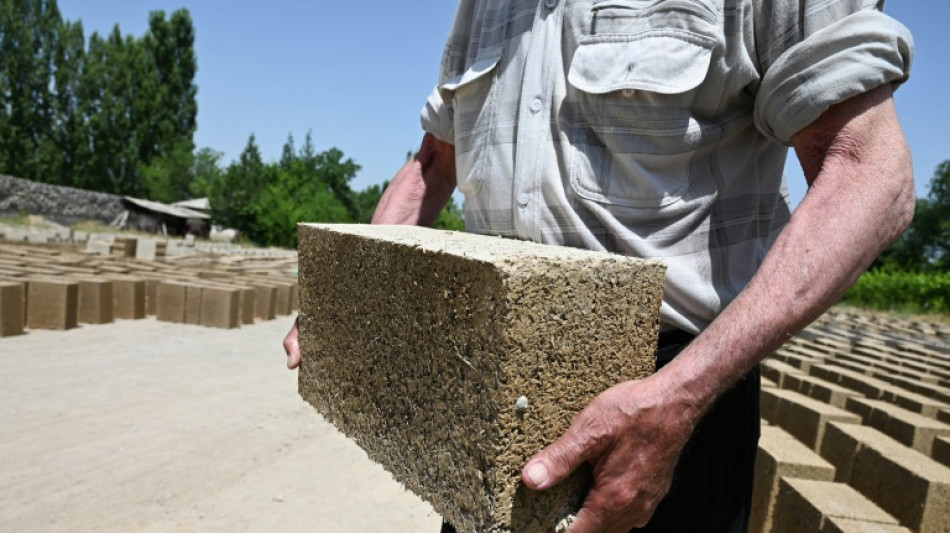
-
 France backs returning colonial-era 'talking drum' to I.Coast
France backs returning colonial-era 'talking drum' to I.Coast
-
King hails 'spirit of unity' as Britain remembers 7/7 attacks

-
 US measles epidemic its worst of 21st century
US measles epidemic its worst of 21st century
-
Djokovic survives scare to reach Wimbledon quarters, Sinner in action

-
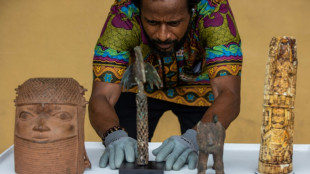 Looted art: the battle for looted treasures
Looted art: the battle for looted treasures
-
Trump slaps allies Japan, South Korea with 25% tariffs

-
 Belgian Merlier wins crash-marred Tour de France dash to Dunkirk
Belgian Merlier wins crash-marred Tour de France dash to Dunkirk
-
Celebs light up Schiaparelli to open Paris Haute Couture Week

-
 Youth camp confirms 27 dead as Texas flood toll nears 90
Youth camp confirms 27 dead as Texas flood toll nears 90
-
Respect for Lara stops Mulder short of world Test record

-
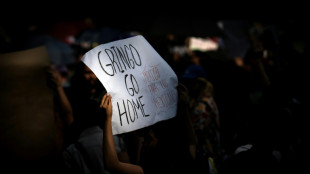 Mexico president slams xenophobia after anti-gentrification protest
Mexico president slams xenophobia after anti-gentrification protest
-
Djokovic stays on track for Wimbledon glory under Federer gaze

-
 Belgian Merlier wins crash-marred Tour de France stage
Belgian Merlier wins crash-marred Tour de France stage
-
Djokovic battles back against De Minaur to stay on track for Wimbledon glory

-
 Israel, Hamas hold indirect talks ahead of Netanyahu-Trump meet
Israel, Hamas hold indirect talks ahead of Netanyahu-Trump meet
-
Trump steps up pressure for deals as US tariff deadline nears

-
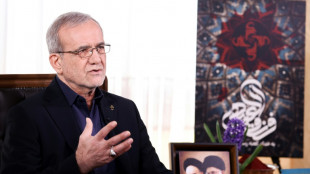 Iran president says Israel attempted to assassinate him
Iran president says Israel attempted to assassinate him
-
Russia says minister fired by Putin killed himself

-
 Ex-All Black Nonu extends Toulon deal, aged 43
Ex-All Black Nonu extends Toulon deal, aged 43
-
Stocks diverge as US tariff deadline looms

-
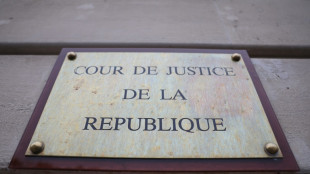 French court dismisses government Covid response probe
French court dismisses government Covid response probe
-
Children's camp confirms 27 dead, with Texas flood toll over 80
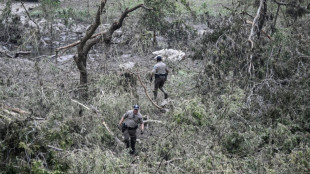
-
 BRICS' criticism brings Trump 10% tariff threat
BRICS' criticism brings Trump 10% tariff threat
-
Houses made from rice: Kyrgyzstan's eco-friendly revolution
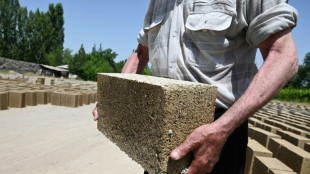
-
 Croatia govt lashed over 'disgraceful neo-fascist Woodstock'
Croatia govt lashed over 'disgraceful neo-fascist Woodstock'
-
Victims of London 7/7 attacks remembered as king hails 'spirit of unity'

-
 Poland starts border checks with Germany in anti-migrant clampdown
Poland starts border checks with Germany in anti-migrant clampdown
-
Wiaan Mulder: slow ascent to Test cricket's batting heights

-
 England coach McCullum says paceman Archer 'ready to go' against India
England coach McCullum says paceman Archer 'ready to go' against India
-
Djokovic, Sinner on Wimbledon collision course

-
 Vaughan says Crawley 'lucky' to have so many England caps
Vaughan says Crawley 'lucky' to have so many England caps
-
Russian forces claim first foothold in new Ukraine region
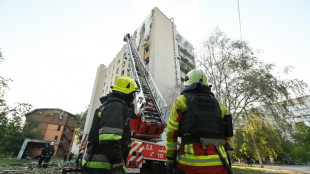
-
 US envoy says satisfied with Lebanese response on disarming of Hezbollah
US envoy says satisfied with Lebanese response on disarming of Hezbollah
-
European stocks, dollar firm as US tariff deadline looms

-
 Wimbledon blames 'human error' for embarrassing line-calling glitch
Wimbledon blames 'human error' for embarrassing line-calling glitch
-
Three things learned from British Grand Prix

-
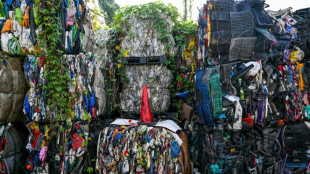 NGOs laud tougher Malaysia plastic trash import laws
NGOs laud tougher Malaysia plastic trash import laws
-
Mulder makes highest South Africa Test score

-
 UK marks London 7/7 attacks as king hails 'spirit of unity'
UK marks London 7/7 attacks as king hails 'spirit of unity'
-
Apple appeals 500-mn-euro EU fine

-
 Crowds celebrate Nepal ex-king's birthday in show of support
Crowds celebrate Nepal ex-king's birthday in show of support
-
Bali flights nixed after huge Indonesia volcano eruption

-
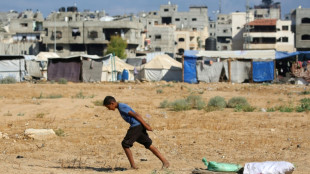 Hamas, Israel resume talks as Netanyahu set to meet Trump
Hamas, Israel resume talks as Netanyahu set to meet Trump
-
Hong Kong fans queue for opening of Cristiano Ronaldo exhibition

-
 Itoje back as Lions take no chances against ACT Brumbies
Itoje back as Lions take no chances against ACT Brumbies
-
Stock markets struggle as Trump's tariff deadline looms

-
 Nearly 450,000 Afghans left Iran since June 1: IOM
Nearly 450,000 Afghans left Iran since June 1: IOM
-
North Korea bars Western influencers from trade fair tour
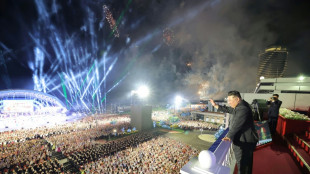
-
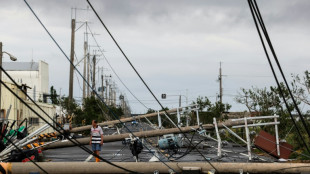 Typhoon Danas kills two, injures hundreds in Taiwan
Typhoon Danas kills two, injures hundreds in Taiwan
-
Dutch coastal village turns to tech to find lost fishermen
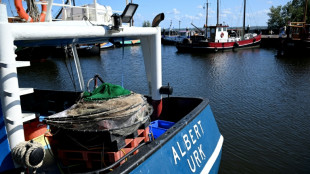

Houses made from rice: Kyrgyzstan's eco-friendly revolution
It may look like an ordinary building site but Akmatbek Uraimov's new house in Kyrgyzstan is being built with blocks of rice.
The eco-friendly alternative to conventional construction materials is booming in the Central Asian country, which is vulnerable to global warming and grapples with water shortages.
Before selecting the unorthodox material, Uraimov had researched other options, but concluded that the relatively cheap blocks made from rice husks were his best option.
"In terms of insulation, cost, as well as for builders, it turned out to be convenient," said Uraimov, who lives in the village of Kyzyl-Kiya in southern Kyrgyzstan.
"People didn't know about it. Now they see it, they are interested, they call," he told AFP.
Nursultan Taabaldyev is one of the pioneers of the technology in Central Asia hailed as an environmentally friendly alternative to water-intensive concrete.
In a workshop in his home region of Batken, rice dust was billowing into the air from the husks, the rough outer shell of rice which is normally thrown away or burned.
Workers with protective masks over their faces were compressing the bricks before rushing to dry them, and helping clients load the finished blocks onto trucks.
They are "made of 60 percent rice husks. The rest is clay, cement and a chemical-free glue," Taabaldyev told AFP.
When dry, they are as strong as cement thanks to silica naturally present inside the husks.
"This idea came to me as a child, while doing carpentry with my father," said Taabaldyev.
The 27-year-old has already built "300 houses" in five years -- first with sawdust, then with rice.
- 'No particular danger' -
When he started, there was little robust research into the technology.
That is starting to change.
Several initial studies from various countries have highlighted the potential economic and environmental benefits of using rice blocks in construction.
Crucially, they require less cement, which is responsible for approximately eight percent of global carbon dioxide emissions, according to 2023 figures from the World Economic Forum.
In her village in a mountainous and arid region, Ykhval Boriyeva has also opted for rice blocks, praising their insulating qualities.
Her house remains "warm in winter and cool in spring" thanks to its low thermal conductivity.
"We save on coal. The walls retain heat and coolness well," she said.
The material is also well within reach, with the Batken region producing a third of Kyrgyzstan's rice crop.
"Rice waste is thrown into the fields, slowly burns, harms the environment, and is not used as fertiliser. So we decided to recycle it," Taabaldyev said.
The problem of dealing with rice waste is even more acute in large rice producers like India.
There "31.4 million tons of rice husks fill landfills and cause environmental problems," according to a study late last year published by Springer Nature.
"Farmers are happy for us to remove rice waste because its accumulation creates a fire risk" in barns if ventilation is poor, said Taabaldyev.
But as for the fire hazard to buildings made of rice, a regional official from Kyrgyzstan's emergency situations ministry said there was "no particular danger".
- Next up 'crushed reed' -
Farmer Abdimamat Saparov is another who has welcomed Taabaldyev's innovative approach, pointing at the mounds of rice waste.
"After harvesting and drying the rice, about 40 percent of waste remains, which we have no way of processing," said Saparov.
Such abundance makes the blocks cheaper than ordinary building bricks -- another crucial factor in southern Kyrgyzstan, where the average monthly salary is around $230.
Cement is more expensive in Kyrgyzstan than anywhere else in Central Asia and the government is mulling adding it to a list of socially sensitive products, alongside bread and oil, that would allow it to dampen surging prices.
Having proved the concept in the mountainous region, Taabaldyev dreams of industrialising production, expanding internationally and eyeing up even more potential materials.
"I want to go to (neighbouring) Kazakhstan to make bricks from crushed reed and straw," he said.
L.Miller--AMWN